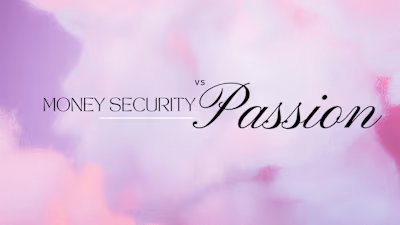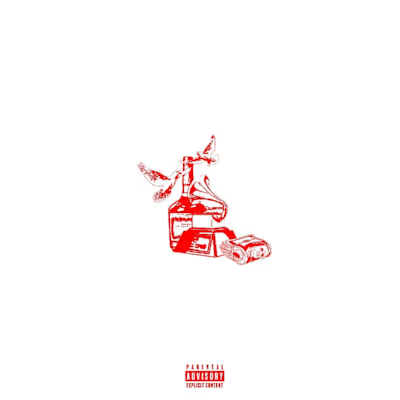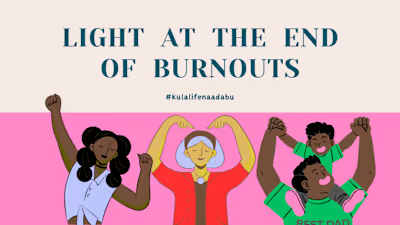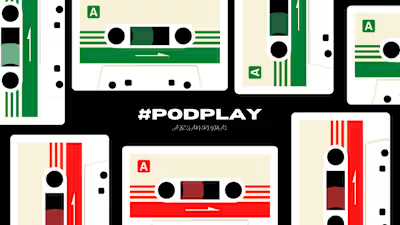#Interview with Sound Queens: Janice Iche, Shishi Wanj, BBYY. a…
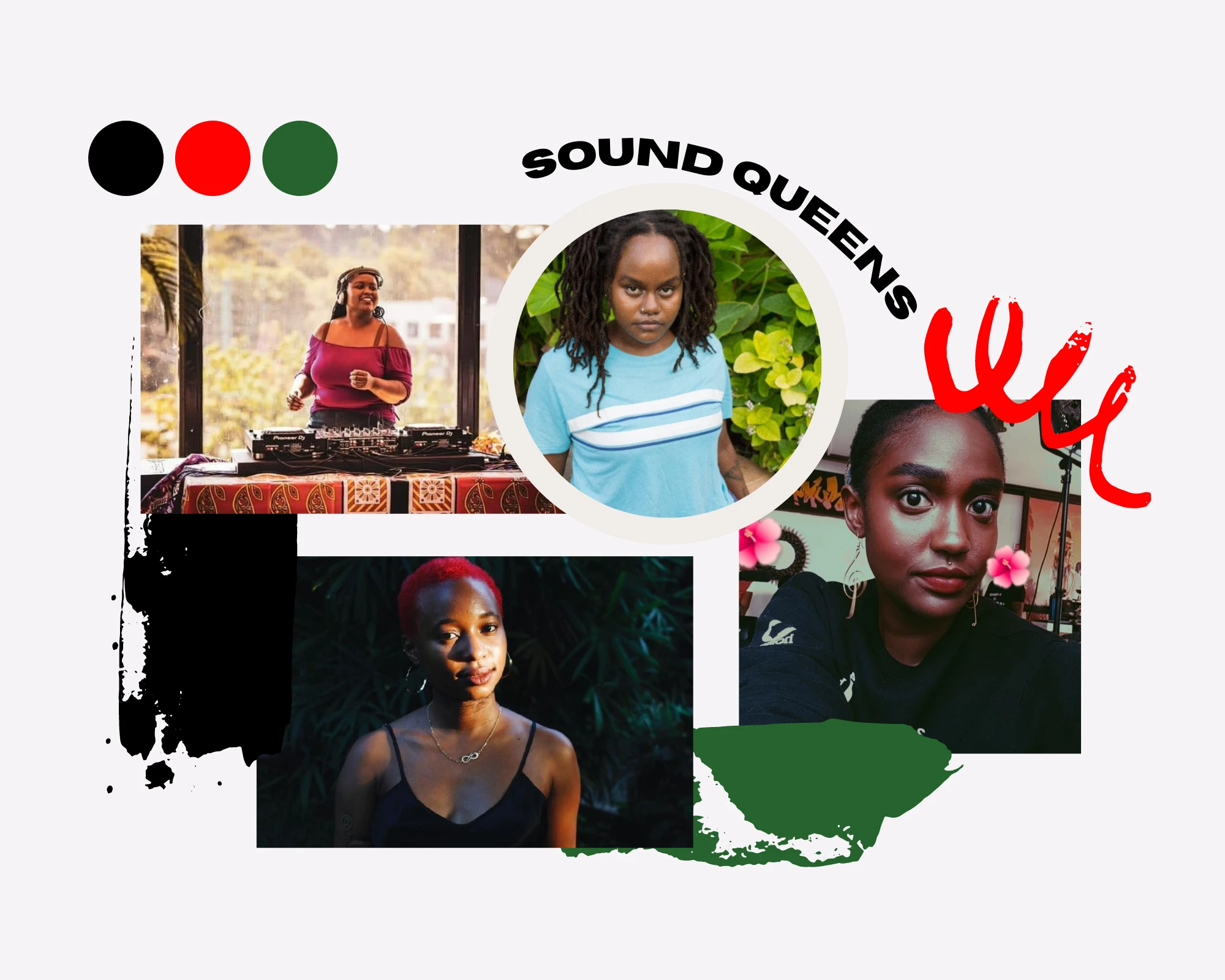
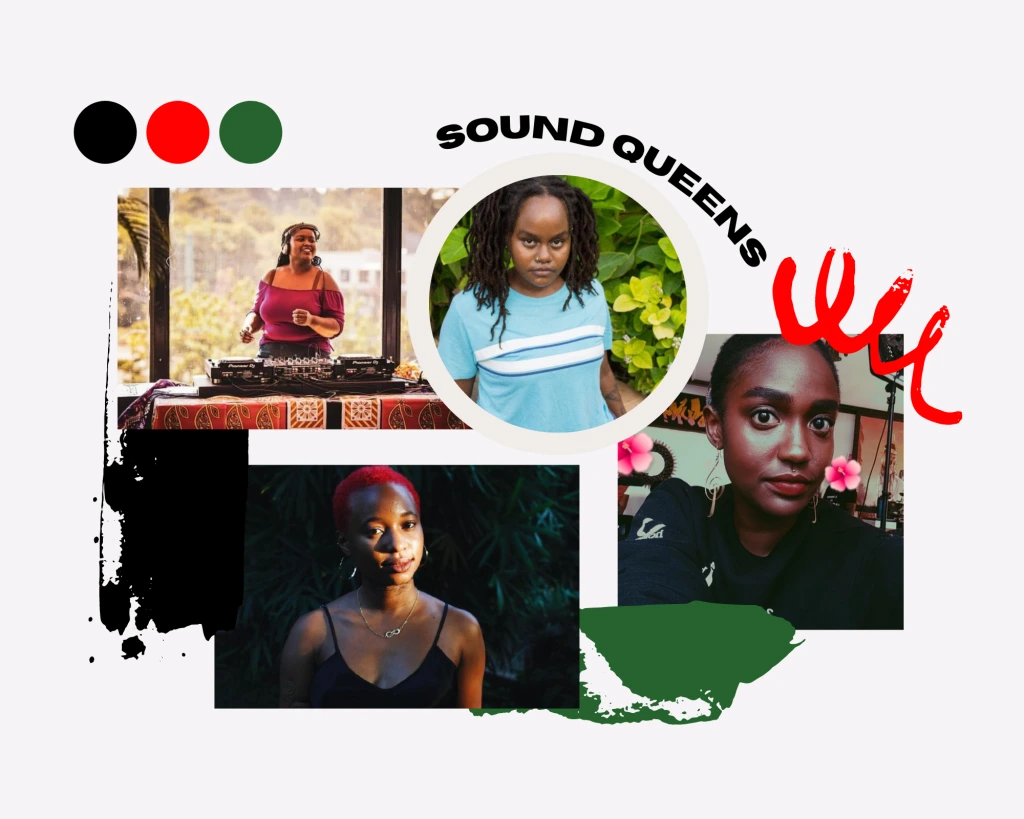
Clockwise from top left: DJ Shock, BBYY., Shishi Wanj, and Janice Iche
Kenyan music is still on a transition, perhaps in its final stages to full-blown glory for its main players, The Creatives. We know of the artists-the vocalists, rappers, and singers, the producers are starting to gain their deserved shine, and now, even more so during the pandemic, the Deejays want a piece of cake they very much add flavor to, even though some shamefully suggest, it’s just on the icing. DJs/Producers have always played an integral part in shaping and defining the culture, they call what’s hot or not-either on radio or clubs and now even on Digital Streaming Platforms and still play the part of curators to people eager to discover new music.
This flourishing community is home to some fascinating, divergent, and adept women who are trailblazing a path for future generations. I chatted to 4 Sound Queens: Janice Iche, An aesthetic producer, singer, songwriter, and DJ; Shishi Wanj a DJ, Writer, and Curator; BBYY. a producer that makes part of XPRSO; and DJ Shock a DJ and Sounds Entrepreneur.
Issa: The DJing and to an extent track producing industry is still growing especially for its female masters, What state is the scene currently in and what are some of the challenges currently facing you in that regard?
Shock: I am concerned about the limited skills a segment of DJs have. Not just female DJs, DJs in general nowadays. A DJ needs to be as versatile as possible. As much as we have our favorite genres, equipment, and software, getting too used to the familiar has landed several DJs in comfort zones that limit the work they can do and the events they can be booked for. I would encourage DJs to try as many different DJ setups as possible, learn as many types of Dj software that they can, and experiment with genres that they don’t usually like or play, go visit DJs at their gigs where they are playing music you don’t usually listen to, observe and keep learning. The industry is evolving and the more you grow, the faster you can adapt when changes happen.
Iche: The scene is growing, expanding, as ever. I am privileged to currently be part of a group of women and nonbinary producers in Nairobi that has been fostering a lot of my growth, which is a new kind of thing for our scene I would say. Though being based in Mombasa comes with its challenges, with the scene here being extremely small and underdeveloped. Also, I am finding myself missing out on a lot of opportunities in Nairobi which I am having a bit of a hard time reconciling.
BBYY: I know a handful of Kenyan female producers as is, S. Onyango Obbo* is my fave btw -so I’d say we’re not quite there yet with girls in Kenya knowing that this is a thing that they can learn and do and be good at with time and practice. The scene is still very male-dominated.
ShiShi: It’s improving, it’s growing. There are more and more women not only taking over these spaces but also helping each other out and building together. Personally, for me, my only challenge is that we are not enough or we are not respected enough to be in these male-dominated spaces. There’s a superiority complex that exists that people don’t even recognize, but we move.
Issa: Most of you, say, Janice is DJing, Singing and producing-Shishi is out Djing, Curating and Writing-Shock is Doing sounds for events and a DJ too-Is versatility and/or putting effort in different scenes essential for growth as a DJ or just as a queen in the Kenyan industry?
Shock: I believe that these ladies are maximizing their various gifts and pursuing their dreams, as am I. Personal growth and equipping oneself for where you want to go in life is an important, ever-continuing process, the more you sharpen yourself, the more you increase your value to others in the marketplace, in being of service to other people. As a person overall, you had value even before you were conceived in the womb and that doesn’t change, you are valuable always.
Iche: Versatility is essential for growth for me as a person. Not only do I apply it in my creative life, but I also apply it in my daily life and expressions. So yes, I believe a lot in spreading yourself far, within your limits of course.
BBYY: Versatility is important generally for a producer, I believe. DJing, while a different artform in itself with different technicalities, is very important for a producer whether it’s purely for the love of the mix, taste-making purposes, promotions or just putting yourself out there. And most people (femmes especially I find) with enough passion for music to become a producer, usually dabbles in some other form of the industry because of the love for music.
ShiShi: No, I don’t find it essential, it is however beneficial. We wear all those hats because those are things we are passionate about and love working on. It’s very difficult to find a creative who only dabbles in one art form. I don’t think our minds work that way. We have a lot to say and we need many outlets, especially right now as women to express our various perspectives in life and art.
Issa: Is being set apart and labeled as female DJs/Producers good for its growth as it recognizes inclusivity, or does it limit you?? And how far along does those go-Are DJ treatments different at the moment to your male counterparts??
Shock:I have had gigs where people have booked me specifically because I am a female DJ. It seems for some people, especially ladies, view female DJs as a symbol of empowerment, which is a positive thing. On the other hand, I did start my career being identified as a DJ, not just a female DJ. It also still works in my favor because it means that people see you as equal to what the gentlemen on the decks do. I do feel that more platforms are needed for female DJs, but for women to access them, we do need to commit to working harder than the guys to be taken seriously.
Iche: I appreciate the emphasis sometimes just to make sure the message is getting across to girls and women out there that they can also do what they want to do. Also for the opportunities, I’m grateful that there is an intentional focus on distributing resources to girls and women in different professional fields. Though it is also harmful and limiting because this is a patriarchal world we live in and that emphasis on women being professionals continues to propagate the harmful notion that a woman being a professional is a spectacular phenomenon to be awed by and that women exist for the consumption and pleasure of men.
BBYY: I think being recognized as a femme DJ/ Producer is good for people looking to encourage the inclusivity of it all. However, it can also lead to a lot of patronizing and infantilization by male DJ / PRODUCERS who still think women can’t do what they do.
ShiShi: To bring honesty, I find it a bit of cringe when people insist on the label “female DJ”. It implies that what I do I so profound for a woman to be doing, it should be unheard of. Are we not in 2021? It does create a common familiarity that builds community around us as women in this industry, but that’s just it. Ok, we’re women who happen to do this, and then? It’s limiting to my assumed level of talent, skill, and taste. Men are getting the jobs more because they are simply DJs, whole women less because adding the prefix “female” turns it into a whole thing for promoters.
Issa: What steps should be taken or what matters need to be shed some light on to take female DJing/producing to the next level??
Iche: The safety of women in the art/entertainment industry, which means addressing ableism and patriarchal injustices all around. But, the safety of women in the work (and home) environment needs to be addressed a whole lot more. That means figuring out culturally relevant accountability structures in the art/entertainment industry. Safe environments have the power to foster authentic expression.
Shock: The biggest thing that women have voiced, is the need for safe spaces where women can produce or practice deejaying. Access to facilities, learning, and support is also helpful and I am seeing women grow and be encouraged from those initiatives.
BBYY: More workshops like the Femme Electronic by Santuri Safari where girls interested can learn how to develop creatively & technically, and network with other people in the industry as well. I think femme DJs/Producers in Kenya could also use more coverage and promos because they’re some lovely women making great waves in the underground.
ShiShi: F**k gender, what’s your talent? What’s your skill? What are you bringing to the table? Once we understand that every single person has their unique way of doing things DESPITE gender, the better for all of us. Give women unbiased access, platforms, and opportunities that you would give anything other creative despite their gender.
Issa: There’s been mention of groups, workshops and/or initiatives prioritizing Female DJs/Producers and what they do, like BBYY who mentioned Femme Electronic by Santuri Safari, any other entities we could shed light on?
Iche: SimSima is the name of the group, under Santuri East Africa. I applied to be part of it sometime last year and it is already growing to accommodate more people and goals. The group aims to impart knowledge and resources on professional women and nonbinary people in the music industry and I believe there will be more opportunities by Santuri and SimSima for more people to apply for in the coming future.
Issa: Any message or advice to aspiring female creatives?
Shock: Trust that God has put treasures in you, don’t listen to anyone who says that your sexuality is the only card you can play to make it in this industry. You are a daughter full of dreams, gifts, ideas, and aspirations. Manifest them, they were given to you to shine light and make the world a more beautiful place. Because you were here!
Iche: Decide what it is you want to do. Figure out what you want to say and how you want to say it. Hold on tight to your passion and motivation and START. Begin. Yes, dedicate some time to think things through but begin when it is time to begin. Begin as soon as you can. The rest you will figure out quite easily along the way. If you can gain more skills to be in more control over your work and creativity, by all means, do so. Learn sound engineering, how to edit videos, produce your music, play an instrument, etc. And use that knowledge to empower more women in any way.
BBYY: Love the process. Push through the learning curve. Don’t be afraid to experiment with different sounds and sonic aesthetics. Be yourself. And keep going.
ShiShi: Don’t shake when you’re the only lady in the room. Instead, stand tall and show them what you’re made of and what they’ve been missing. Build bridges, not walls. What you do in these rooms will create ladders for other women like you to show off that feminine creative touch.
A look through Tinashe Mwaniki’s social media accounts visualizes her truth “My face is my Canvas”. The virtuoso Make-Up Artist is 21 years old and possesses an enviable skill set and cultured mind define the current golden crop of Nairobi Creatives. The proud libra has honed her skills from 2019 but says the introspective lockdown period helped her finally decide to stick to make-up content creation and step into the professional pool. Decision fans and beauty enthusiasts would love to hear.
Tinashe Mwaniki
Personally, the lockdown was an eye-opening experience; I got to know that make-up is what I love to do now and in the future.
The make-up industry is not all beauty though, as I learned, its links to Social media involve feedback that could invite negative energy from consumers or destructive comparisons with other MUAs. Tinashe has navigated this with realism and healthy mental boundary, confidence plus comfort in her skin, and unwavering belief in her final creative outputs.
We caught up with the refreshing soul, Tinashe Mwaniki, and chatted about her journey, make-up artistry, colorism, & more.
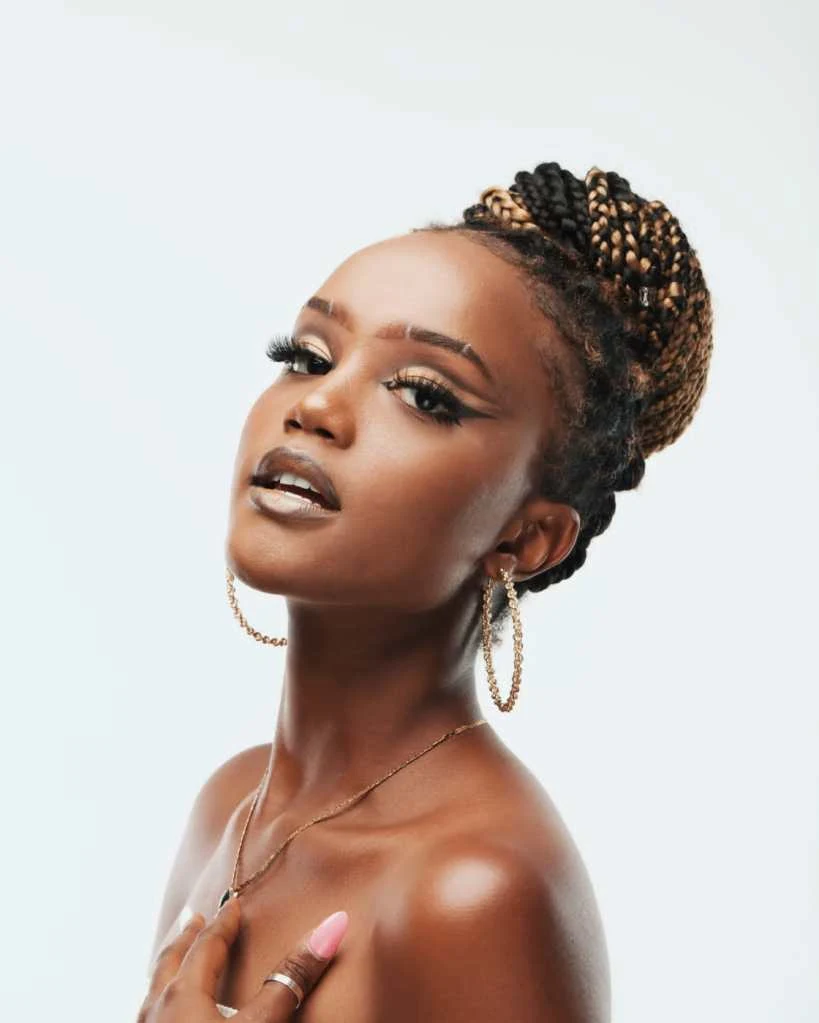
TINASHE MWANIKI. by shemobara
Tell us a bit about Tinashe Mwaniki as a human being and creative. I say creative because sections of people downplay what Make-up artists do as just a means to beautify and not as artistic or creative skills.
I am 21 years old. Libra. I love make-up, music. I enjoy my alone time. I would say I’m an ambivert; my energies shift as per whom I’m with…And Oh, I’m about to be a YouTuber. I don’t know if that counts, but , just subscribe to my YouTube channel Tinashe Mwaniki. That’s my brand name on all social pages. Creatively, I’m an MUA specializing in aesthetic cosplay, SFX make-up, and creative make-up, which is hard to box, but it’s all techniques and make-up skills. I also do make for other people, so hit me up.
Last time we communicated, two things were happening the world felt normal and more outgoing post-pandemic, and you were doing exams, how were the exams, and if you don’t mind letting us in, what were you studying about?
I was doing Computer Science at Strathmore,(laughs) as per my results the exams were okay. Last year was a bit of both world, more relaxed but stressful. Taking school at home was relaxing, but juggling that and content creation slowed me down as it was my last year. Looking back, it was fun as I didn’t have to see a lot of people, and I feel fulfilled I’m finally done with school.
We are now sort of going into lockdown all over again; did the Lockdown influence your work, and how? Any lessons you will implement in the new lockdown phase?
Editor's Note: Liable to first and second phases of Kenya Covid lockdown
First of all, I feel like the whole pandemic was a blessing in disguise for me. I had a whole lot more time on my hands and did more looks. Actually, last year I blew up more cause I increased my creative output. I interacted with more MUAs, and I added to my skillset with a lot of learning and doing looks I didn’t even think I would. Personally, the lockdown was an eye-opening experience; I got to know that make-up is what I love to do now and in the future.
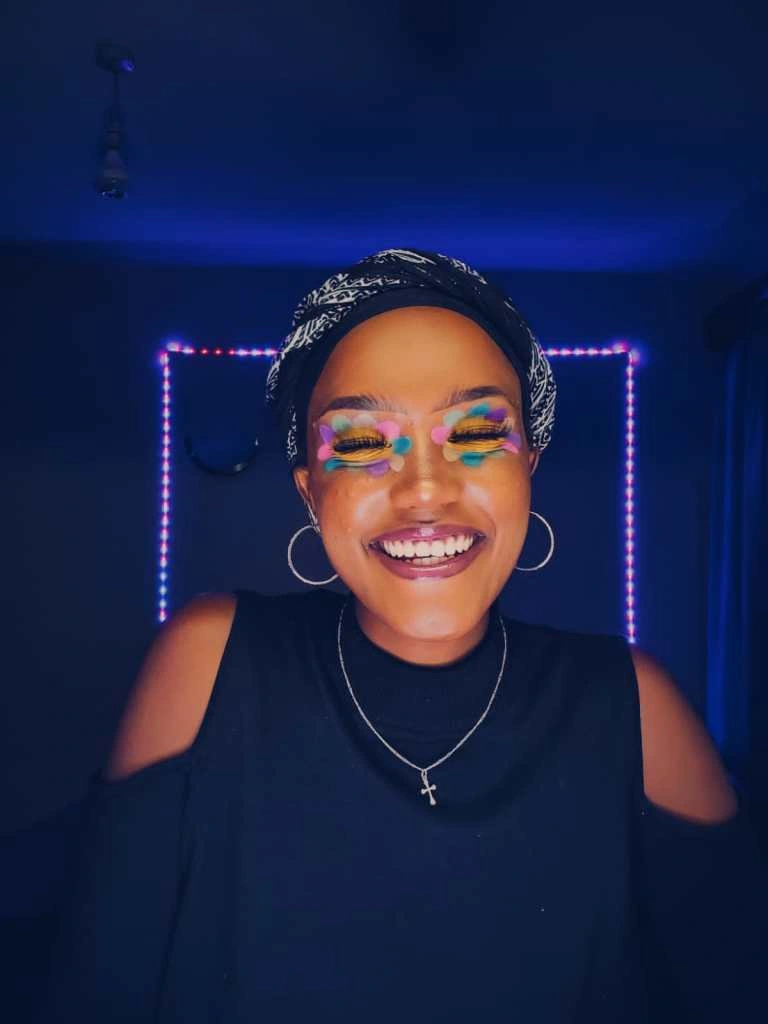
High quality is an identity to your work. Do you get requests to do make-up? Talk to me about the experiences and any advice during that process and dealing with clients.
I just started doing people’s make-up professionally, before that I got loads of DMs asking I do that but for free, (laughs) After I put the price out it’s like “Oh!! I didn’t know but good luck with your work”. As of now, I am still learning to work on people’s faces. I still do it to my best ability. At first, it was frustrating yet challenging. It’s a whole other thing; you have to know skin tones, eye shapes, brow shapes. It’s different, especially if you are used to your face. It’s pretty difficult; I won’t sugarcoat that fact. There’s no in-between with your client; either you can do it like they want to, or you can’t.
That said, I’d advise MUAs that it’s not really about commercializing your abilities. If at the moment you love doing it on your face, ride that wave and grow with it. Stick to what you passionate and comfortable about. But if you commit to growth and go commercial, fly with it too.
Correct me if I am wrong, but the MUA industry is one that at large is seen as female-oriented but also largely consists of male experiences. Are there any difficulties and challenges you have faced just because you are a woman?? and any piece of advice to men trying to get into what you are doing?
I’ve just started to see this like men doing what society terms as female-oriented industries; my nails are mostly getting done by dudes. In Kenya, it’s not so normal, having a guy in a nail salon, but guys actually do it so well. Some of the MUAs I look up to are men like James Charles or Jeffery Star. Dennis Karauri does really amazing MU too. Make-up looks good on men too-I love that more young Kenyan men are taking up doing make-up. It’s not limited to any gender division.
Colorism is a big issue, though. Brands tend to pick up light or brown-skinned girls more than dark-skinned girls. It’s insufferable and even goes into actual products; some products neglect darker skin tones. Regrettably, Color is a big issue in the MUA industry right now.
How would you describe the state the MU industry in Kenya is? Are there stable/permanent opportunities, or it’s all down to freelancing, any general challenges, and how have you overcome them?
I love the industry now. So many fire MUAs are comping up, that inspires me. I haven’t been at work or worked with people, but for most MUAs, it’s down to freelancing. There’s a lot of categories. I have a lot to experience still professionally. Still, for me, you have to commercialize it, and a niche, whether bridal, effects like movies, SFX MUA, and head into media streams make content and get paid by brands. It’s not stable, especially as a source of income, unless you have a whole make-up store or boutique. Clients are also not so constant and consistent, so power to freelancing.
You have seemingly grown through social media. What has that journey been like, and any advice you have regarding that to aspiring MUAs.
It’s been fun, but not every day is a good day. I enjoy every process of it though the outcomes are not always dreamy. You might work on a look hard and for a while, but for consumers, it might not really be a hit; I don’t let it limit me, though. Aspiring MUAs, Just start doing it, let it flow; there’s a lot to learn, and it could get messy. I got to learn a lot through me doing make-up. I know my abilities better, what I can do for my skin or can’t do certain skin types. I’ve experienced so much. I am split about social media; it’s made to look perfect. We hardly go with what we term ugly for social media. Just cause some MUA had sure likes for a particular look doesn’t mean you should look down on yourself if you don’t get the same or vice versa. I always go for posting what I am really proud of and satisfied with. Put yourself first, even on social media. What people like or don’t like is not on you. Get satisfied and comfortable with your content and not what reaction it raises.
Quickfire questions: What has been your favorite look so far?; The hardest to do look?
It’s so hard to pick a favorite look; I have so much love for all of them. I also put a lot into all of them. The hardest I had to do was a Bob Ras painting that I had to do for a school competition, and I literally drew it on my face. It was so detailed, even with the colors. It can be aggravating, especially cause I want to do it right.
What inspires you through your different looks?
Inspire is such a big word. It can literally be anything like I can be watching a movie or scrolling down Pinterest. Half the time, though, no lie, I am sitting doing brows, my eye shadows, then creatively expand off that. Probably go to my boards on Pinterest; follow Tinashe Mwaniki btw. From there, I just make up a look. Letting it flow is vital, Say the Sukuna One; I had my eye look but wanted more of it. I remembered a friend suggested an anime-inspired look; looking it up, I found a cosplay look that really went well with the eye look. So people also inspire me.
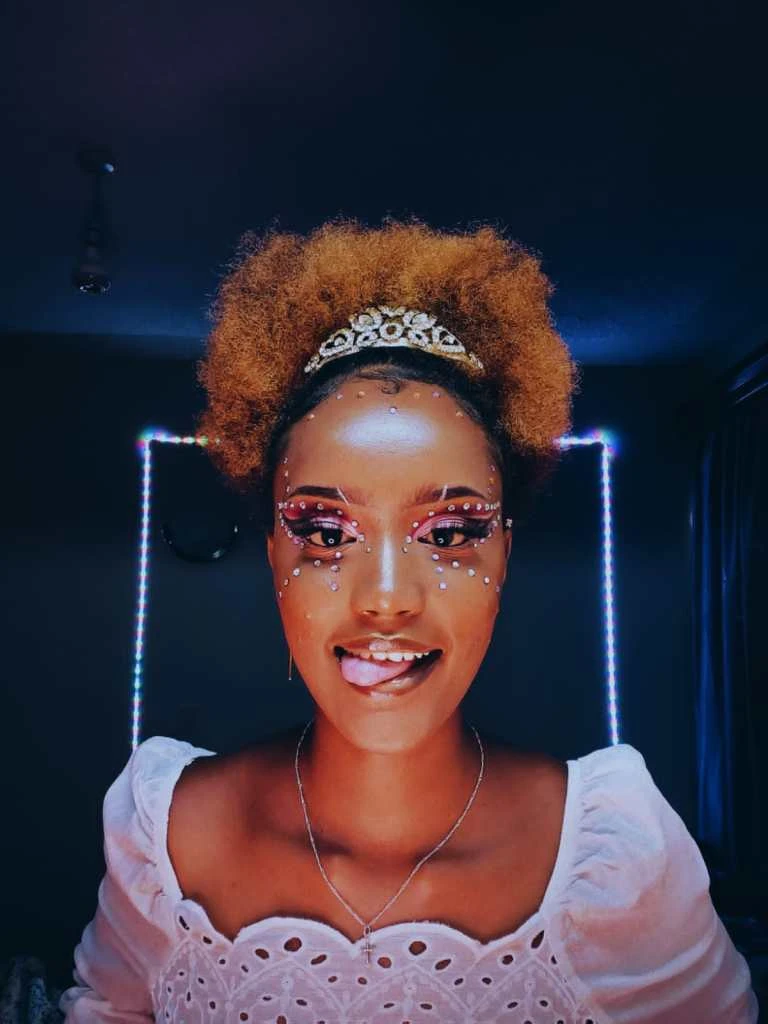
What is your take on beauty standards and insecurities to anyone reading this right now?
Everything, EVERYTHING online, is fake. Everyone goes with the best version of themselves on the internet. No insecurities, imperfections, no one can see who you really are. That can mess you up, especially if you see everyone working out, smooth skin, and toned bodies-Don’t let the internet be the space you set standards for yourself. That can adversely affect your mental health once you compare what you even do with everyone else. I listened to this podcast “Anything Goes” by Emma Chamberlain on the topic INSTAGRAM ILLUSION; It helped me think and realize a lot that goes into what you or I post. We tend to present the best version of ourselves, not necessarily the authentic version of ourselves. I hope this pushes you to accept yourself, love yourself. If you can, work on yourself; make yourself feel good.
If you are open to work, how can people reach out to you?
I am open to work under Covid regulations, of course. Reach out to my social media pages: IG, Twitter, Pinterest, TINASHE MWANIKI, and TikTok as Tinashe Mwanikii. I had so much fun too.
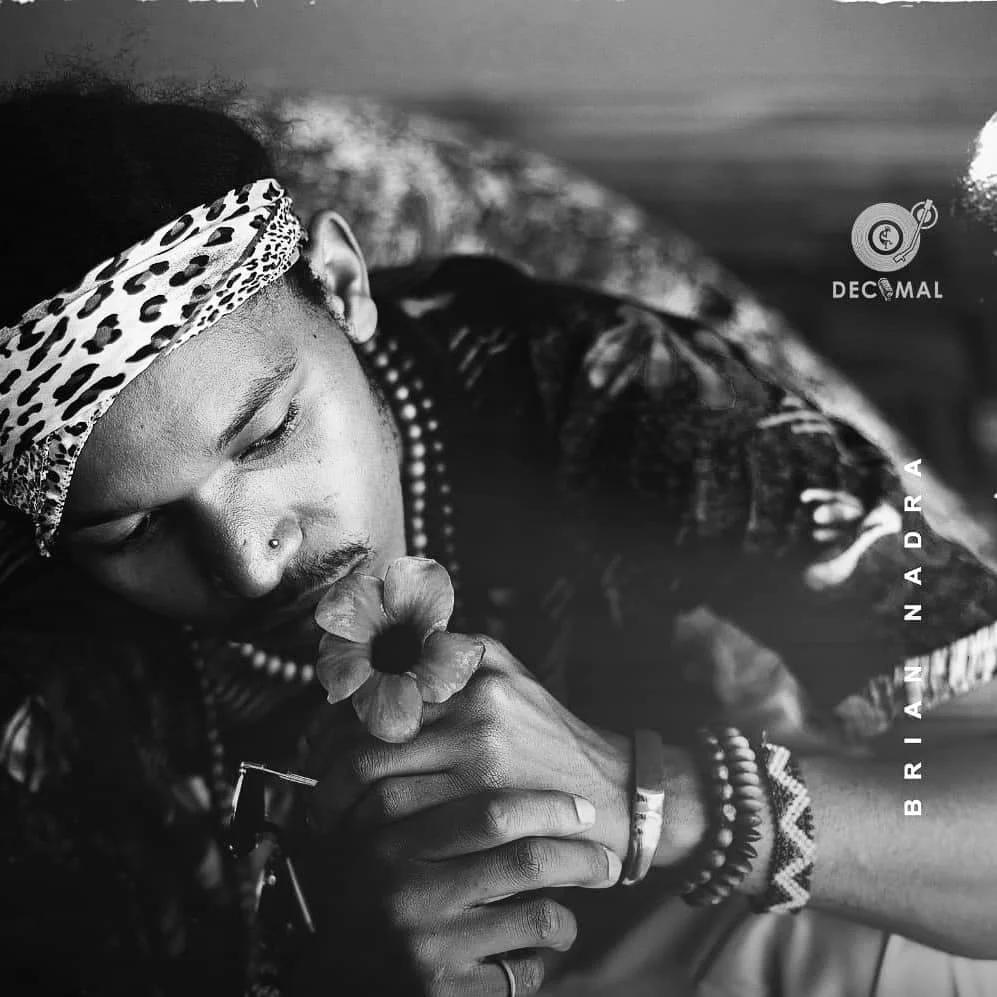
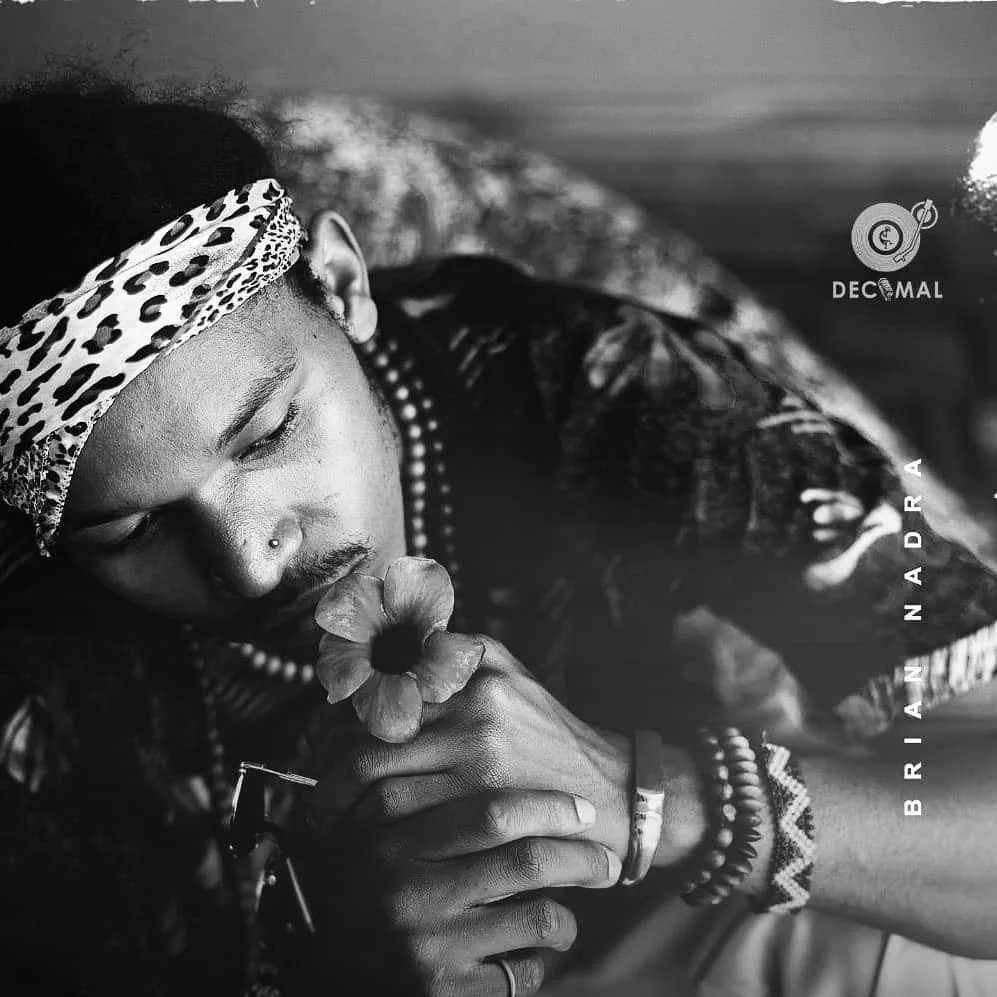
My earliest memory of Brian Nadra was his feature on BBC 1Xtra’s artists to watch out for in 2020. To be selected in a pool of five artists on a reliable international platform is more or less a feat. Even better, though, he rubbed shoulders with; Sho Madjozi, JoeBoy, Innoss’B, and Sheebah. All of them are riding their highs, so too should Brian. His discography timeline goes four years back and features acclaimed bangers in Entanglements, Drinx na Mayenx, and recently released Booty. So, I’m hoping Nadrenaline is the delayed or maybe timed start of Nadra’s ascendancy.
My first taste of the project was the promotional single, Booty, featuring veteran Bon’Eye and street rap lord Zzero Sufuri. The eight-track project also features KonKodi, Nviiri The Storyteller, and Kenana Mwawasi. Based on that, I feel the project will be centered around themes of love and ‘sherehe sheria’ escapades. In usual Kejani 1-listen fashion, I play the songs from start to finish with no skips or replays, giving my honest gut reactions.
1. Chocolate
Sudden start off the top, I lowkey hoped for an intro. It’s dancy, heavy on influences of Lingala and Chakacha, something out of his comfort zone yet familiar to him. I wonder what Nadra’s music background is like. The flow is so accomodating, linking seamlessly with the pre-chorus. I’m still torn on the chorus; it could have been more catchy. Why am I thinking of Longombas? I’d cue this with one of their songs in a mix.
Haha, it’s never Lingala without mid-song interludes; the earliest form of ad-libs, maybe?? Hehe. I like this for the sampling and choice to embrace an African identity on production. However, I’m not sure about the decision to have it as track number one or its length.
2. Bella
Vibessssssss, my head is bopping. He is showcasing his greatest asset, the vocals. Can I call this AfroPop Highlife? It is well mixed and mastered too. There is a harmony in the contrast of his vocals which feel like blues, and the groovy beat. Mad catchy too, he switches to some Swahili; weddings will love this one. Decimal Records have a gem in Brian Nadra. He is talking about the dreams for his music and its potential to Bella-the dream girl. And at this rate, cheers to Nadra going “…to hollywood and dancing with the stars…”
3. Entanglement ft KonKodi, Bon’Eye
Released prior as a single on the height of the Jada-August saga, entanglement will have you reminiscing of your sexual innuendos. Entanglement is a radio clean sexual song, something Kenyan artists are not famed for(Hi Lamba Lolo). The chemistry and collaborations with his label mates Bon-Eye and KonKodi most usually result in bangers.
4. Pumzika ft Kenana Mwawasi
Yes, some Swahili RnB. Nadra all luring and sensual with his lyrics-a kifo kisimani metaphor and no wonder he mentions Shakespeare. Yooooooh, the trumpets caught me by surprise, but I love how much flavor it adds. Production has been great so far. I’m excited to hear Kenana for the first time; Female RnB acts are killing it in Kenya at the moment.
There she is and lives up to it, “…my fantasies anatimiza…”. Complicit and sultry with her delivery tone. An exchange of their hypnotic vocal ranges as the song heads to a conclusion.
5. Kahora ft KonKodi, Bon’Eye
An alternative highlife yet calming production laced with a vernacular Kikuyu verse and feel-good hook. The piano keys set a serene ambiance; I really love this; my nighttime playlists have an addition. There is a cinematic appeal on the beats, and it is my highlight on this track. I hope it was a deliberate move, pairing the language and the sound. Paints you the picture of what Brian may be expressing amazingly in Kikuyu. KonKodi picks up and fittingly delivers, swiftly backed by another vernacular verse by the confident Bon’Eye.
6. Over and Over
I love how this starts, might be playing this over and over. Afrobeats is at a different sonic level from a couple of years ago; Nadra realizes that. He is almost soulful, although I invite him to draw out more melodies with his delivery too. He is high-key about the feelings directed to his heart’s interest. I expect this to be a lowkey banger.
7. Booty ft Bon’Eye, Zzero Sufuri
The take that gengetone reflects the culture and not really about the sonics might be evident here. Booty cycles around the party and drinking spree activities that shape Nairobi’s nightlife “Kidnapping of booze is rampant here…Ulevi Atmosphere, Eeeh Kanairo fear.” The beat is sublime and different, and I can’t help but cave into the need to get down to this. The hook is highly relatable and sheng’-reflective, the verses speaking a truth most young people live through their weekends. Haha, did Bon’Eye say, “Gotea Gilberto, Johnie ako walking”? KonKodi’s verse is a highlight take on my overall favorite tune on the project. TikTok, clubs, and radio will have fun playing this. Zzero is hella versatile, never stutters on whatever challenge that approaches him. He delivers another stellar feature.
8. Belly ft Nviiri The StoryTeller
Mans had to cater to the two body parts that define a lit clubbing night: Booty and Belly. The two songs also define the current Kenyan party sound. Brian, alongside Nviiri, feels like Chris Brown and Trey Songz in their prime. Nadra’s delivery caught in between sung and raps, well suited to him. Nviiri cocky and majestic as always; Nadra should take a leaf of Nviiri’s ability to engulf listeners with melodies. A perfect ending to what has been a good listen.
Kenyan music is currently transitioning from the just-give-us-some-airplay to realizing and accepting the quality KE artists have. Through this phase, though, is a time to filter and define the music and artists that can lead a generation. Brian Nadra is one of the faces that embody the high caliber of artistry in our country. In Nadrenaline, the potential is visible, but there is a need for clarity about his greatness in hopefully more projects to come. That said, it is a great listen with cuts that can fit your different moods and speak out your desires.
Like this project
Posted Nov 19, 2024
Clockwise from top left: DJ Shock, BBYY., Shishi Wanj, and Janice Iche Kenyan music is still on a transition, perhaps in its final stages to full-blown glory f…
Likes
0
Views
12




